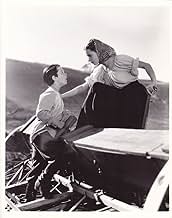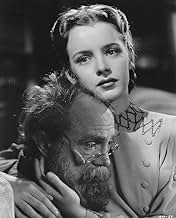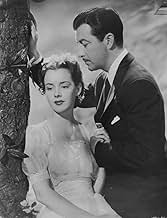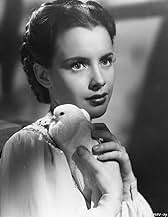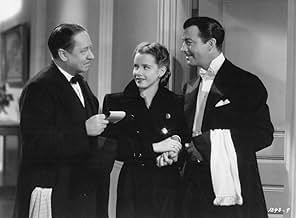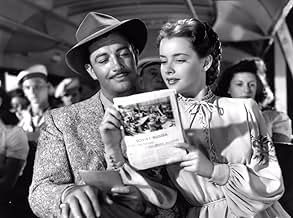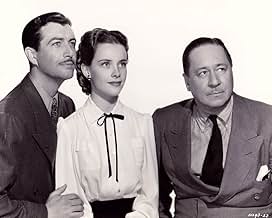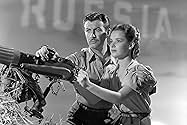Füge eine Handlung in deiner Sprache hinzuPropaganda film from WW2, designed to raise the awareness of the American public regarding USSR's fight against Nazi Germany.Propaganda film from WW2, designed to raise the awareness of the American public regarding USSR's fight against Nazi Germany.Propaganda film from WW2, designed to raise the awareness of the American public regarding USSR's fight against Nazi Germany.
- Auszeichnungen
- 2 wins total
Konstantin Shayne
- Wounded Soldier
- (as Konstantine Shayne)
John Wengraf
- Red Army Commander
- (as John E. Wengraf)
Empfohlene Bewertungen
Look: This film IS propaganda, but it certainly isn't Soviet propaganda. I think it is clear from watching the film disinterestedly and/or reading ALL of the transcripts of Ayn Rand's HUAC testimony that it was American wartime propaganda aiming at 1) strengthening political ties with its then-ally Soviets, and 2) convincing the American's that they should support the joint effort with the Russians against Germany. The US was too afraid to admit to the American people that they, like, Churchill said, had to work with the devil to defeat Hitler; they used propaganda film instead (ad not just here, but overtly as part of Frank Capra's "Why We Fight" series). Further, I think it is probable, as a previous poster mentioned, that they are only guilty of writing a very ill-conceived "love knows no bounds" kind of war time love story; this is just a year or so after Casablanca, after all! The movie certainly was picked up, partly on the basis of the love-knows-no-bounds angle, but more overtly b/c, as the awful Robert Taylor pointed out in his own HUAC testimony, the request came from the US State department.
"Song of Russia" was never made to accurately portray Soviet peasantry, but rather to enlighten the West of the Anti-Nazi plight of the Russian citizens.Director Gregory Ratoff is no more guilty of tainting the truth for entertainment's sake than were many American directors for their careless, racist portrayal of the "savage" American Indian.
Stalin and Hitler were both maniacal murderers, but in 1943 much less was known of the atrocities these two leaders committed. If Western leaders had known better in 1943, greater efforts should have been made to stop the bloodshed. 20/20 hindsight gives us great power to criticize filmmakers of that period, but what of Roosevelt and Churchill? What did they know, and what did they do about it?
"Song of Russia" was a warning and a call for help.Although Russian peasants weren't as "Americanized" as the film portrays, they did defend their land against the fascists and lost over 20 million people doing it.I enjoyed the film, and yes, I thought the peasants looked a bit well-to-do for the period, but that helped me imagine what we as Americans might have confronted if the Nazis had made it past England and Russia.
Stalin and Hitler were both maniacal murderers, but in 1943 much less was known of the atrocities these two leaders committed. If Western leaders had known better in 1943, greater efforts should have been made to stop the bloodshed. 20/20 hindsight gives us great power to criticize filmmakers of that period, but what of Roosevelt and Churchill? What did they know, and what did they do about it?
"Song of Russia" was a warning and a call for help.Although Russian peasants weren't as "Americanized" as the film portrays, they did defend their land against the fascists and lost over 20 million people doing it.I enjoyed the film, and yes, I thought the peasants looked a bit well-to-do for the period, but that helped me imagine what we as Americans might have confronted if the Nazis had made it past England and Russia.
During the period of truce of the Hitler-Stalin pact, American symphony conductor Robert Taylor is touring the Soviet Union with his manager Robert Benchley. Soviet classical pianist Susan Peters stalks Taylor, but eventually gets to meet him when she sits down and plays Tonight We Love. That little piece of Tschaikovsky was a big pop hit in America at the time.
It's a tender love story that develops between Taylor and the classical groupie and they marry. He visits her in her village, meets her people and is really impressed by the way they've just taken to Communism.
Of course Hitler blinks in the game of diplomatic chicken he was playing with Stalin and attacks the Soviet Union. The people organize and resist. What will happen with Taylor and Peters.
Robert Taylor resisted loud and long about doing this film, it seared at his anti-Communist soul. But he was also an agreeable contract employee at MGM and Louis B. Mayer said he wasn't thrilled about it either, but that the request for this film came directly from the Office of War Information. Of course being hammerlocked into doing Song of Russia is what ultimately led to Taylor being a friendly witness at the House Un American Activities Committee.
You could see Taylor's heart wasn't in this one. Susan Peters comes out so much the better. What a tragic loss she was, a bright beautiful girl with a great career ahead of her, paralyzed and eventually dying from a hunting accident.
Like 20th Century Fox's North Star, Song of Russia has so much music in it, it could qualify as a musical. Jerome Kern and E.Y. Harburg contributed a forgettable song called And Russia Is Her Name. Like North Star, Song of Russia was later cited as two of the three biggest examples of Communist influence in Hollywood, the other being Mission to Moscow.
The Soviets at great sacrifice saved the world from Hitler and made it possible for Soviet ideological driven imperialism to move into the vacuum. Now that the Cold War is receding in our collective consciousness, maybe a film showing the Russian contribution to winning World War II can be made without arousing all the right wing yahoos.
This one certainly wasn't it.
It's a tender love story that develops between Taylor and the classical groupie and they marry. He visits her in her village, meets her people and is really impressed by the way they've just taken to Communism.
Of course Hitler blinks in the game of diplomatic chicken he was playing with Stalin and attacks the Soviet Union. The people organize and resist. What will happen with Taylor and Peters.
Robert Taylor resisted loud and long about doing this film, it seared at his anti-Communist soul. But he was also an agreeable contract employee at MGM and Louis B. Mayer said he wasn't thrilled about it either, but that the request for this film came directly from the Office of War Information. Of course being hammerlocked into doing Song of Russia is what ultimately led to Taylor being a friendly witness at the House Un American Activities Committee.
You could see Taylor's heart wasn't in this one. Susan Peters comes out so much the better. What a tragic loss she was, a bright beautiful girl with a great career ahead of her, paralyzed and eventually dying from a hunting accident.
Like 20th Century Fox's North Star, Song of Russia has so much music in it, it could qualify as a musical. Jerome Kern and E.Y. Harburg contributed a forgettable song called And Russia Is Her Name. Like North Star, Song of Russia was later cited as two of the three biggest examples of Communist influence in Hollywood, the other being Mission to Moscow.
The Soviets at great sacrifice saved the world from Hitler and made it possible for Soviet ideological driven imperialism to move into the vacuum. Now that the Cold War is receding in our collective consciousness, maybe a film showing the Russian contribution to winning World War II can be made without arousing all the right wing yahoos.
This one certainly wasn't it.
Revisionist history can prove unfortunate. There is very little that moves along with apparent 'truth' in this film, BUT it was made at a critical time in our history -- a time when it was necessary to create unity between those fighting the horrors of Nazism. No, the film is not a very good one, but it is a formidable piece of history and should be watched with the adult comprehension of the time. And there is absolutely NO EXCUSE for the wreckage wrought by McCarthy-Cohn and their henchpeople during the Red Scare era that destroyed lives!! No excuse at all. As for SONG OF RUSSIA, it should also survive as a reminder of the screen aura of Susan Peters. (As for her true abilities, watch this one and then SIGN OF THE RAM!!) Along with the obvious propoganda about the 'perfect' society of the USSR, the worst part of this film, of course, is the usually awful performance of Robert Taylor, whose post-War attitudes were those of a true coward, as well as a lousy actor.
"Song of Russia" is far from a great film, but it is really fascinating to look at nowadays, both as a historical time capsule and as an excellent specimen of MGM camp. The film was designed to drum up sympathy for our then-allies, the Soviet Union, and is sheer, unabashed propaganda. It is well-enough made, but, meaning no disrespect to the millions of Russians who suffered and died during the war, it is so cornball and manipulative seen now that its difficult to take seriously. In fact, its most famous now for the after-effects of its release at the end of the 40's in the HUAC meetings where Robert Taylor testified and "named names" and where it caused all sorts of problems for its makers. Robert Taylor rises to his usual heights of bland adequacy here, but Susan Peters, a tragic actress if ever there was one, does quite well as his Russian bride.
Some of the more hilarious scenes include a wedding dance where the entire village takes part and come across more like a Broadway troupe with decades of experience and the depiction of the "typical" Russian village,which looks like a Slavic version of Andy Hardy's small town. Miss Peters character is also quite the Russian Superwoman - a concert pianist who can cook a mean dinner when she's not riding tractors, shooting machine guns and teaching a class of schoolchildren how to make a Molotov Cocktail. Its amazing she was able to be convincing in the slightest degree in this role, but she does as well as anyone could.
Some of the more hilarious scenes include a wedding dance where the entire village takes part and come across more like a Broadway troupe with decades of experience and the depiction of the "typical" Russian village,which looks like a Slavic version of Andy Hardy's small town. Miss Peters character is also quite the Russian Superwoman - a concert pianist who can cook a mean dinner when she's not riding tractors, shooting machine guns and teaching a class of schoolchildren how to make a Molotov Cocktail. Its amazing she was able to be convincing in the slightest degree in this role, but she does as well as anyone could.
Wusstest du schon
- WissenswertesDebut of actress Joan Lorring.
- PatzerAlthough the film is set during the Axis invasion of the Soviet Union in 1941, uniforms and equipment shown in both the stock footage and the American-filmed scenes are largely from the period of 1943-44, when the film was made. Of particular note are the helmets and rank insignia which are indicative of this later era.
- VerbindungenFeatured in Red Hollywood (1996)
- SoundtracksPiano Concerto No.1 in B flat minor, Op.23
(uncredited)
Music by Pyotr Ilyich Tchaikovsky
[Played by Susan Peters on piano, with an orchestra at a rehearsal; Reprised at a concert on tour in Russia, with Albert Coates on piano; Reprised by Peters in a New York concert; Excerpts played often in the score, adapted by Herbert Stothart]
Top-Auswahl
Melde dich zum Bewerten an und greife auf die Watchlist für personalisierte Empfehlungen zu.
Details
- Erscheinungsdatum
- Herkunftsland
- Sprachen
- Auch bekannt als
- Sången om Ryssland
- Drehorte
- Produktionsfirma
- Weitere beteiligte Unternehmen bei IMDbPro anzeigen
Box Office
- Budget
- 1.828.000 $ (geschätzt)
- Laufzeit
- 1 Std. 47 Min.(107 min)
- Farbe
- Seitenverhältnis
- 1.37 : 1
Zu dieser Seite beitragen
Bearbeitung vorschlagen oder fehlenden Inhalt hinzufügen


